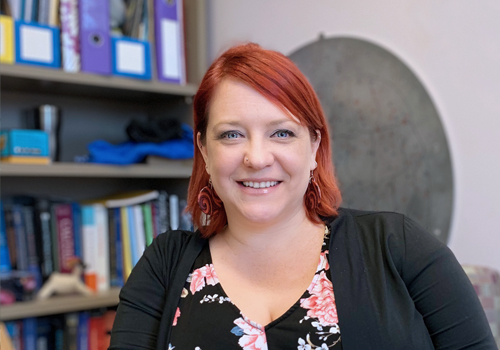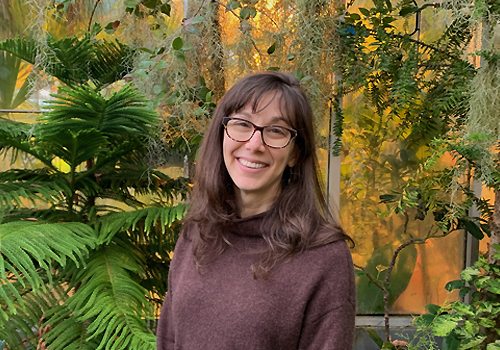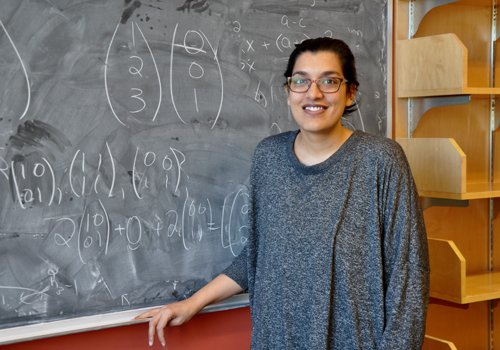Three University of Toronto researchers — all from the Faculty of Arts & Science — have been awarded prestigious Sloan Research Fellowships for 2020.
Renée Hložek, an assistant professor at the Dunlap Institute for Astronomy & Astrophysics, Chelsea Rochman, an assistant professor at the Department of Ecology & Evolutionary Biology, and Ila Varma, an assistant professor at the Department of Mathematics will each receive USD $75,000 over a two-year period to stimulate their fundamental research.
“We are very proud of these wonderful researchers who have achieved such exemplary work so early in their careers,” says Melanie Woodin, dean of the Faculty. “They have demonstrated both the exceptional level of research being done within disciplines, as well as the diversity of scholarship throughout the Faculty. It’s wonderful to see them join the ranks of our distinguished U of T Sloan Fellows.”
Sloan Research Fellowships have been awarded since 1955 and recognize extraordinary early career researchers at US and Canadian institutions for their high standards for achievement, creativity and leadership.
“To receive a Sloan Research Fellowship is to be told by your fellow scientists that you stand out among your peers,” says Adam F. Falk, president of the Alfred P. Sloan Foundation. “A Sloan Research Fellow is someone whose drive, creativity and insight makes them a researcher to watch.”
Renée Hložek: Next Generation Cosmology

As a cosmologist studying the universe as a whole, Renée Hložek is striving to answer some of the most fundamental questions in all of science.
“What happened in the first few moments in the life of the universe?” she asks. “What is the nature of the dark matter that dominates the structure and formation of the universe? What is driving the acceleration of the universe?”
Hložek aims to better understand how the early, chaotic universe expanded and evolved into the universe of stars and galaxies we see today. She is doing this as part of the collaborations that are building the Simons Observatory in northern Chile and developing the LiteBIRD satellite mission. Both are designed to observe the light from the universe when it was less than 400,000 years old, known as the Cosmic Microwave Background (CMB).
She is also investigating two of the most puzzling elements that make up the universe: dark matter and dark energy. Dark matter is the matter we can’t see directly but whose existence is revealed by its gravitational influence. Hložek’s insights into a possible dark matter candidate — an as yet undetected particle called an axion — have proven invaluable in making progress in this inquiry. Through her role with the Large Synoptic Survey Telescope (LSST), Hložek is also probing dark energy — the enigmatic energy thought to explain the accelerating expansion of the cosmos.
“I genuinely keep pinching myself,” says Hložek. “I am so pleased to receive an award that for me signifies new and innovative research. I admire previous award winners and I'm honoured to be among them. This award will enable me to support people in my team to take on new challenges in observational cosmology.”
Chelsea Rochman: From research to informed policy

While the image of a sea turtle eating a plastic bag is an iconic illustration of the danger of plastic pollution, less obvious is the threat posed by the invisible or barely visible bits of plastic in the environment known as microplastics.
Chelsea Rochman has spent much of her career conducting pioneering work on the source of microplastics, what happens to them once they enter the environment and what effect they have on organisms as well as marine and freshwater ecosystems.
Rochman has conducted pioneering work in this young field and is currently planning or conducting research programs in the Canadian Arctic, Ontario watersheds, the Great Lakes and the IISD Experimental Lakes Area (ELA) in northwestern Ontario. In the ELA, she will be leading the first ever whole-ecosystem experiment on microplastics, using an entire ELA lake as her lab.
“Although plastics have improved the lives of millions, we are now recognizing that plastic pollution may transform our ocean's ecosystems,” she says. “As policy-makers seek to understand and respond to plastic pollution, there is an urgency for further scientific inquiry to inform decisions. I’m incredibly grateful to the Sloan Foundation for providing me the resources to answer this call.”
Rochman has worked extensively with industry, government and the public. She was an expert witness in hearings that culminated in December 2015, when President Barack Obama signed the Microbead-Free Waters Act that banned plastic microbeads in cosmetics and personal care products. She continues to participate in UN meetings with the ultimate goal of a global treaty on plastic pollution.
Ila Varma: Probing the mysteries of numbers

Ila Varma has been awarded the fellowship for her research into the statistical properties of abstract objects to order better understand the fundamental properties of counting numbers — also known as integers.
“Any non-zero integer can be created using only prime numbers and negative one. It is very important in the study of integers — a field known as number theory — to understand how and why. This understanding allows us to zoom out into the more generalized, deeper structure known as number fields, the foundational objects of modern number theory.”
Mathematicians over millennia have created a complex language of mathematical objects to describe and explain number fields — including their degrees, discriminants, class numbers and class groups. Just as a statistician would use mean or distribution to better understand the likelihood of an event, Varma's work in the field of arithmetic statistics helps to better understand the likelihood that integers in number fields have the same arithmetic properties as the integers we grew up with.
The most interesting and long-standing open questions in this field require more sophisticated applications of tools and Varma is working to create these new methods.
“While the field of arithmetic statistics is a fairly new area of number theory, it is rooted in the study of classical open questions dating back to the 18th and 19th centuries,” says Varma. “I thank the Sloan Foundation for recognizing the potential in furthering this research on these fundamental mysteries in arithmetic.”
Hložek, Rochman and Varma join 70 faculty from University of Toronto who have received a Sloan Research Fellowship since its inception in 1955, including John Polanyi for chemistry.

